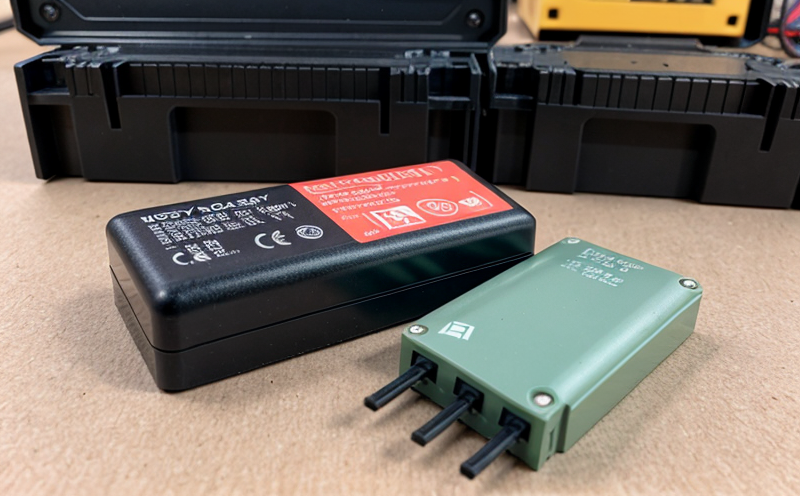SAE J1798 Performance Testing of Battery Pack Systems for EVs
The SAE J1798 standard is pivotal in ensuring that electric vehicle (EV) battery packs meet stringent performance and safety requirements. This service focuses on the comprehensive testing outlined by this standard, which aims to evaluate the performance characteristics critical for reliable operation, longevity, and safety of EV battery systems. The test parameters cover a broad range of conditions that a real-world EV might encounter, including thermal stress, mechanical shock, and electrical load cycling.
The SAE J1798 protocol is designed to simulate various operational scenarios to ensure the robustness and durability of battery packs. It involves multiple phases, each addressing different aspects of the battery’s performance. For instance, temperature cycling tests are conducted to simulate the extreme conditions that might be experienced during winter or summer. These tests help in identifying any thermal degradation issues that could affect the battery's capacity over time.
Another crucial aspect is the electrical load testing, which simulates real-world driving scenarios by applying various current draw loads. This ensures that the battery can handle peak power demands without compromising performance or safety. Mechanical shock and vibration tests are also performed to verify the structural integrity of the battery pack under dynamic conditions. These tests are essential for ensuring that the battery pack remains intact even in challenging road conditions.
The testing process is not limited to static evaluations; it also involves dynamic assessments such as high-rate discharge, which simulates rapid energy extraction during acceleration or heavy use. Additionally, cold start and recovery tests ensure the battery can perform efficiently in sub-zero temperatures—a critical factor for vehicles operating in colder climates.
Accurate specimen preparation is paramount before conducting these tests. This includes ensuring that the battery cells are properly assembled into modules and packs according to manufacturer specifications. Calibration of all test equipment to internationally recognized standards (ISO, ASTM) guarantees precise and reliable results. The testing environment must also be controlled to ensure consistent conditions throughout the tests.
The instruments used in this process include sophisticated data acquisition systems capable of monitoring voltage, current, temperature, and other critical parameters. These systems provide real-time data that is crucial for identifying any anomalies during the test cycle. Post-test analysis involves detailed examination of collected data to determine compliance with SAE J1798 requirements.
The reporting process is equally important as it ensures transparency and traceability in the testing results. Comprehensive reports are generated highlighting all aspects of the tests conducted, including any deviations from standard parameters. These reports serve not only as documentation but also as valuable tools for quality managers, compliance officers, R&D engineers, and procurement teams to make informed decisions about battery pack designs and manufacturing processes.
In summary, SAE J1798 performance testing is a rigorous process aimed at ensuring the reliability and safety of EV battery packs. By adhering strictly to this standard, manufacturers can provide high-quality products that meet global regulatory requirements while enhancing customer satisfaction through consistent performance under diverse operational conditions.
Applied Standards
The SAE J1798 standard is widely recognized for its comprehensive approach to evaluating the performance of battery pack systems in electric vehicles. This standard is crucial for ensuring that batteries meet stringent safety and efficiency criteria, which are essential for the successful deployment of EVs.
- SAE J1798:2014 – Battery Pack Testing and Evaluation Procedures
- IEC 63005: Battery testing methods
- ASTM D7918-11 – Standard Practice for Mechanical Loading of Lithium Ion Cells, Modules, and Packs
- ISO/TS24563:2020 – Electric road vehicles – Test procedures for the evaluation of battery packs
These standards provide a robust framework that ensures the accuracy and reliability of the testing process. By adhering to these internationally recognized guidelines, Eurolab guarantees that its tests are not only comprehensive but also aligned with global best practices.
Benefits
Increased product reliability: Ensures consistent performance under diverse operational conditions.
Enhanced safety: Identifies potential issues early, reducing the risk of accidents and recalls.
Improved customer satisfaction: High-quality products lead to better customer experiences and loyalty.
Easier market entry: Compliance with international standards facilitates easier acceptance in various markets.
Cost savings: Early identification of problems can prevent costly redesigns and recalls later on.
Innovation support: Comprehensive testing provides valuable data that can drive continuous improvement and innovation.
Eurolab Advantages
At Eurolab, we pride ourselves on offering top-tier battery pack testing services. Our expertise lies in providing accurate, reliable, and thorough evaluations according to the SAE J1798 standard.
State-of-the-art equipment: Utilizing cutting-edge technology ensures precise measurements and consistent results.
Experienced professionals: Our team comprises highly skilled engineers with extensive experience in battery testing.
Comprehensive service: From specimen preparation to detailed reporting, Eurolab offers a full suite of services tailored to your needs.
Global recognition: Compliance with international standards enhances trust and credibility among clients worldwide.
Choose Eurolab for your SAE J1798 performance testing. We are committed to delivering excellence in every project we undertake.





